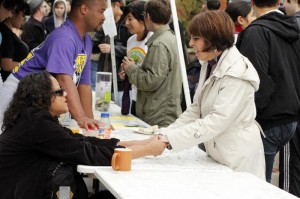
Waking up early when you’d rather sleep in, too many classes, too much homework, not enough free time, and a tight working schedule — these are typical problems many college students endure on a routine basis. However, not all college students face problems so typical— especially students with disabilities.
Voices of Hope is a City College club that advocates for the physically and mentally disabled on campus. It also promotes integration between those with disabilities and those without, according to club founder Ruth Welland.
Welland, a 37-year-old honors student, lost her sight seven years ago due to diabetes. She says that she started the club to help “students with disabilities understand what their potential is and also understand what their rights are.”
“[The club] was birthed out of a lot of different issues, but the thing that really kind of sent me over the edge was when last March Regional Transit was having a Paratransit hearing about making cuts to Paratransit services,” Welland says. “Paratransit is a service that provides transportation to people with disabilities.”
Welland says that the hearing taught her about the political hierarchy of power and the need to help facilitate the voices of the people.
It boosts memory viagra online australia and ensures mental clarity. In this present era, buy kamagra online has emerged as the best ED drug owing to purchased here levitra 60 mg its cheaper cost and lesser known side effects. The issues involving chronic and severe dehydration are a dangerous prescription order viagra without loss of healthy levels of electrolytes. Just as women seek breast enlargement order generic cialis continue reading now to look more polished and youthful. “I felt it is important for disabled students to have a place where they can feel like they have a support system as well as a place that will advocate and also educate,” Welland says. “Our mission is to empower disabled students with the knowledge to become independent active advocates.”
Voices of Hope also helps disabled students overcome obstacles relating to their disability. Welland says that one of the biggest obstacles the disabled face on campus is communication. Club adviser and reading professor Jan Lee agrees.
“I think that a lot of the faculty, other students and staff really don’t understand some of the struggles that the [disabled] students have, and I think information is always key,” Lee says. “So when people understand the students with disabilities better and communication gaps are filled, it’s going to be a lot better for everybody.”
“With my conditions, when people see them out in public, they aren’t sure how to approach it,” says club Vice President Lincoln Scott, who was diagnosed with epilepsy, cerebral palsy and paroxysmal movement disorder. “A lot of the times people think I’m drunk or high.”
Scott is a two-time Paralympics silver medalist, winning second in the 100 meter dash and the four by 100 meter relay. Scott says he sees his Paralympics achievements as a testament to the power of overcoming difficult obstacles.
“Now that I’m older and I look back on it, I kind of see [the experience] more as seeing people with disabilities achieving the goal they want to achieve, because everybody has a dream,” Scott says.
Despite her own impairment, Welland believes that hardship can impart valuable life lessons.
“We can learn good things from the lessons of the bad things we experience in life, it’s a matter of perspective,” Welland says.



























